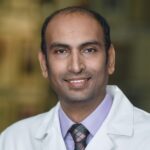Pulmonology
Pulmonologists at HMC in Sugar Land
Goutham Dronavalli, M.D.
(832) 500-1430
What is Pulmonology?
Merriam-Webster defines pulmonology as “a branch of medicine concerned with the anatomy, physiology, and pathology of the lungs.” However, pulmonology incorporates all of the respiratory tract including the nose, esophagus, and, in some cases, the heart.
 What a Pulmonologist Does
What a Pulmonologist Does
Pulmonologists treat diseases of the respiratory tract, including pneumonia, asthma, tuberculosis, and emphysema as well as respiratory complications caused by other diseases and injury. General internists may call a pulmonologist to treat complicated chest infections. In addition to prescribing medications for respiratory problems, pulmonologists provide therapeutic procedures to help patients recover quickly.
Pulmonologists do not perform surgery but they can perform specialized procedures to collect samples from, or look into, the chest wall or lung to make a more accurate diagnosis.
Education Requirements for Pulmonologists
As with all physician careers, students must first earn an M.D. (Doctor of Medicine) or D.O. (Doctor of Osteopathy) from a medical college. After completing medical school physicians must complete an internship and residency program in internal medicine that will last at least three years. Experienced doctors pass down their knowledge to hopeful pulmonologists and hone their skills in diagnosing and treating respiratory problems.
After the residency is complete, physicians must complete a pulmonology fellowship. This usually lasts two years and consists of full-time study of pulmonary disease. Once complete, physicians must become licensed in order to practice medicine. This is usually accomplished by taking the United States Medical Licensing Exam.
